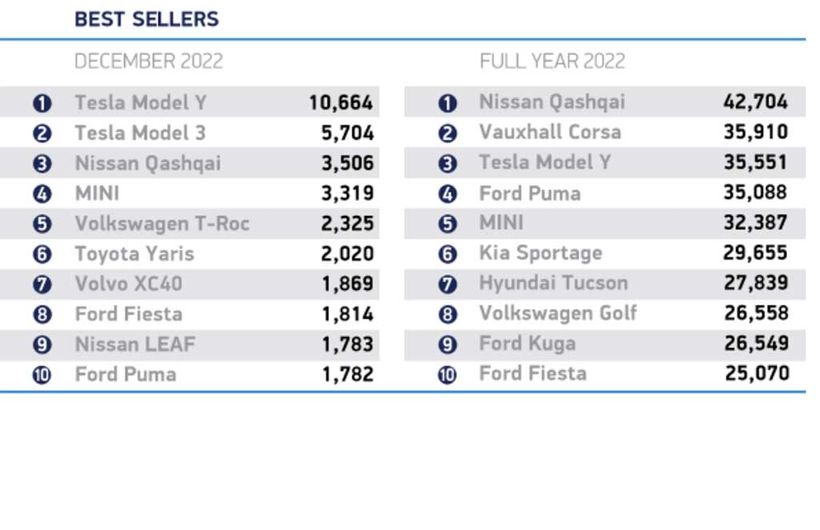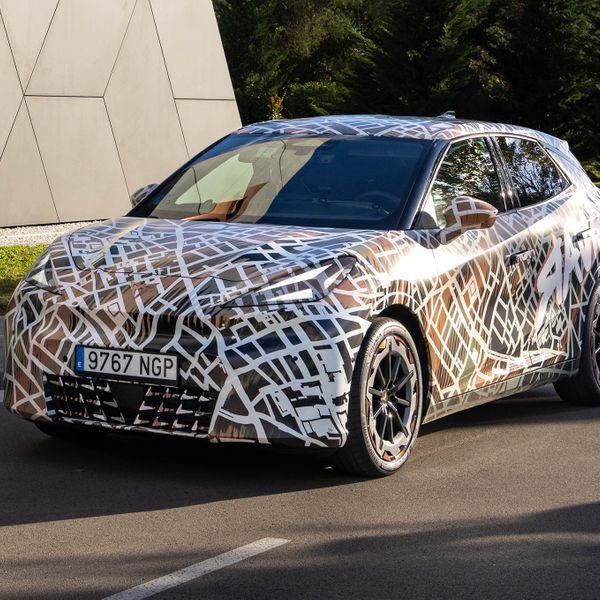Electric cars were the shining star for new car registrations in 2022. With more than a quarter of a million battery electric cars sold, it was the only sector to grow during the year with a 40% increase in popularity over 2021, according to the latest official figures released today (6 January 2023).
However, the increase didn’t stop the total market from falling 2.0% to end the year at 1.61 million cars registered.
Fully electric cars took 16.6% of the new car market while plug-in hybrids took a further 6.3% taking the plug-in total to nearly 23%.
While the best-selling car in 2022 overall was the Nissan Qashqai which does not have a plug-in derivative, the Tesla Model Y was third best-selling car overall and topped the battery electric vehicle chart. The second placed Vauxhall Corsa, which is available as an electric car, did not make the top 10 for fully electric cars.
Second and third places in the electric car top 10 were taken by the Tesla Model 3 and the Kia e-Niro respectively. Fourth and fifth places were taken by the Volkswagen ID3 and the Nissan Leaf. Kia’s fully electric car sales, which accounted for more than 16% of its total, helped the Korean brand break the 100,000 sales milestone for the first time in the UK in 2022.
The upswing for electric cars for the full year was more than replicated for December sales. The final month of 2022 saw fully electric cars account for almost a third (32.9%) of total registrations. While the year was down 2.0% for all car sales, December recorded an increase of 18.3%. This rise was driven by company car purchases – which saw a 46% increase – while private car sales fell more than 7%.
For the year, private buyers accounted for just over half of all new car registrations, however it was the company car market that drove the majority of electric car sales. Two thirds of new fully electric cars in 2022 were company cars and businesses also accounted for three quarters of the volume gain, showing the impact of the favourable company car tax rates for electric vehicles.
The SMMT, which publishes the figures and represents the car makers, blamed the global pandemic and the knock-on impact of supply shortages for the fall in overall sales. The organisation called on government to do more to help private new car buyers to switch on to electric cars.
An SMMT spokesman added: “Ensuring drivers in every part of the country can benefit depends on broader policies to encourage uptake of zero emission-capable vehicles during 2023. For instance, while the industry recognises the need for fair vehicle taxation, plans to introduce VED on BEVs from 2025 with the same ‘premium’ threshold as internal combustion-engine cars will disproportionately penalise those moving to electric.
“Higher production costs mean more than half of all BEV registrations this year would have incurred the ‘premium’ VED if it had been in place, a move which risks discouraging wider adoption.
“Chargepoint provision also remains a barrier to EV uptake. The government’s EV Infrastructure Strategy forecast that the UK would require between 300,000 and 720,000 chargepoints by 2030. Meeting just the lower number would still require more than 100 new chargers to be installed every single day. The current rate is around 23 per day.”












